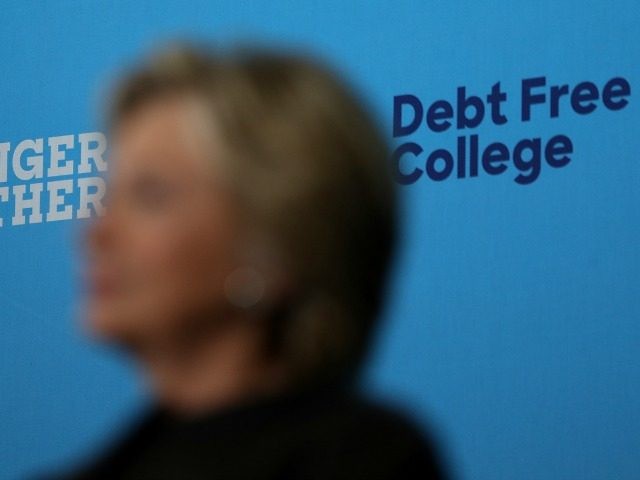The chancellor at Cal says Hillary Clinton’s plan to provide free college tuition to students is a campaign pledge that is unlikely to ever be implemented, and that such a plan would invite unprecedented federal control over university-led research.
“I would love to see the Clinton administration come and make college free for students coming from families earning less than $125,000,” Professor Nicholas Dirks says. “But I don’t think it’s going to happen.”
Dirks spoke at a panel discussion on the topic of “Who Pays For World-Class Universities?” during the Times Higher Education (THE) World Academic Summit.
“[I]f such a thing came to be, there would be a real concerted effort to control parts of some of the great research institutions that are public in ways that might compromise their capacity to compete at the highest level,” he added, noting as well that implementing Clinton’s plan would be a “complicated political process” since state governments oversee universities.
Chelsea Clinton, however, told attendees at East Carolina University in North Carolina Wednesday, “My mom has a plan to help millions of Americans with their debt right now and a plan to make college debt-free for future generations.”
As Reflector.com reports, Chelsea Clinton said her mother’s plan – referred to as a New College Compact – calls for families with incomes of $125,000 or less to pay no tuition at in-state public colleges and universities. Additionally, the Democrat presidential nominee would cap a person’s income that would go toward student loan debt at 10 percent and forgive loans after payments have been made for 20 years.
However, just as with No Child Left Behind and Race to the Top – the latter of which gave us Common Core – Clinton’s “Compact” revolves around the federal government incentivizing states with federal money and perks in return for debt-free tuition for lower income students. Chelsea Clinton said her mother’s plan “will invest $4 of federal money to every $1 invested by states in education. However, this plan calls for states to stop making cuts in their education.”
Nevertheless, writing at Forbes, George Leef also asserts what Dirks observed: that Hillary Clinton can’t “fix” college with more federal interference and control. Leef notes that Clinton’s objective of launching more low-income students into college contains “two mistaken beliefs”: “that the cost of attending is the main reason why many students from non-wealthy families don’t graduate from college and that getting a college degree would be very beneficial to them.”
Leef first observes that, although the cost of college has indeed risen, other low-cost options are available, such as community college – the expense for which can often be covered by Pell grants.
“As for four-year institutions, there are many public schools where tuition remains quite affordable,” he continues. “The higher education market is like the restaurant market — there are options for all budgets. When people shop around for higher education, almost no one is completely priced out.”
Leef further urges low-income students to explore private scholarships such as the United Negro College Fund and the Jack Kent Cooke Foundation.
“The great thing about private scholarships is that they can’t be turned into entitlements,” he notes. “Students have to strive to be thought worthy of support.”
Leef points out, however, that cost is not the primary reason lower income students don’t seek out college.
“The main reason why most don’t enroll isn’t the cost, but rather because they aren’t academically prepared for or (even if academically prepared) interested in devoting more years of their lives to formal schooling,” he says. “Trying to lure such individuals into college with free tuition is a bad idea.”
Observing the current glut of college degree holders with no jobs, Leef asserts the free market reality.
“The economy does not automatically create more ‘good jobs’ simply because more college graduates enter the labor market,” he explains. “Government policy aimed at ‘producing’ more graduates will only mean more young people who are over-credentialed for the work available.”
“America doesn’t have a shortage of people with college degrees,” Leef concludes. “What it does have is a shortage of jobs that pay well. Unfortunately, the Clinton plan would make that problem even worse.”

COMMENTS
Please let us know if you're having issues with commenting.